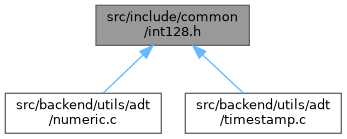
Go to the source code of this file.
Data Structures | |
| struct | INT128 |
Macros | |
| #define | USE_NATIVE_INT128 0 |
| #define | PG_INT128_HI_INT64(i128) ((i128).hi) |
| #define | PG_INT128_LO_UINT64(i128) ((i128).lo) |
| #define | INT64_HI_INT32(i64) ((int32) ((i64) >> 32)) |
| #define | INT64_LO_UINT32(i64) ((uint32) (i64)) |
Functions | |
| static INT128 | make_int128 (int64 hi, uint64 lo) |
| static void | int128_add_uint64 (INT128 *i128, uint64 v) |
| static void | int128_add_int64 (INT128 *i128, int64 v) |
| static void | int128_add_int128 (INT128 *i128, INT128 v) |
| static void | int128_sub_uint64 (INT128 *i128, uint64 v) |
| static void | int128_sub_int64 (INT128 *i128, int64 v) |
| static void | int128_add_int64_mul_int64 (INT128 *i128, int64 x, int64 y) |
| static void | int128_sub_int64_mul_int64 (INT128 *i128, int64 x, int64 y) |
| static void | int128_div_mod_int32 (INT128 *i128, int32 v, int32 *remainder) |
| static bool | int128_is_zero (INT128 x) |
| static int | int128_sign (INT128 x) |
| static int | int128_compare (INT128 x, INT128 y) |
| static INT128 | int64_to_int128 (int64 v) |
| static int64 | int128_to_int64 (INT128 val) |
Macro Definition Documentation
◆ INT64_HI_INT32
◆ INT64_LO_UINT32
◆ PG_INT128_HI_INT64
◆ PG_INT128_LO_UINT64
◆ USE_NATIVE_INT128
Function Documentation
◆ int128_add_int128()
Definition at line 144 of file int128.h.
References fb(), INT128::hi, int128_add_uint64(), and INT128::lo.
Referenced by int8_avg_combine(), and numeric_poly_combine().
◆ int128_add_int64()
Definition at line 117 of file int128.h.
References fb().
Referenced by do_int128_accum().
◆ int128_add_int64_mul_int64()
Definition at line 203 of file int128.h.
References fb(), int128_add_uint64(), INT64_HI_INT32, INT64_LO_UINT32, StaticAssertDecl, x, and y.
Referenced by do_int128_accum(), int64_div_fast_to_numeric(), and interval_cmp_value().
◆ int128_add_uint64()
Definition at line 92 of file int128.h.
References fb().
Referenced by int128_add_int128(), and int128_add_int64_mul_int64().
◆ int128_compare()
Definition at line 425 of file int128.h.
Referenced by interval_cmp_internal(), and interval_sign().
◆ int128_div_mod_int32()
Definition at line 308 of file int128.h.
References fb(), and remainder.
Referenced by int128_to_numericvar().
◆ int128_is_zero()
◆ int128_sign()
Definition at line 402 of file int128.h.
References x.
Referenced by int128_to_numericvar().
◆ int128_sub_int64()
◆ int128_sub_int64_mul_int64()
Definition at line 266 of file int128.h.
References fb(), int128_sub_uint64(), INT64_HI_INT32, INT64_LO_UINT32, x, and y.
Referenced by do_int128_discard().
◆ int128_sub_uint64()
Definition at line 158 of file int128.h.
References fb().
Referenced by int128_sub_int64_mul_int64().
◆ int128_to_int64()
Definition at line 468 of file int128.h.
References val.
Referenced by interval_hash(), and interval_hash_extended().
◆ int64_to_int128()
Definition at line 450 of file int128.h.
References INT64CONST, INT128::lo, and val.
Referenced by int64_div_fast_to_numeric(), interval_cmp_value(), and interval_sign().